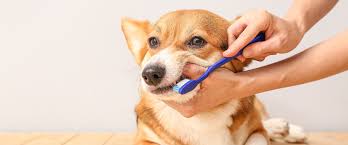
Dental Care for Dogs: A Guide to Healthy Teeth and Gums
Written by Darwin's
Maintaining healthy teeth and gums is essential for your dog's overall well-being. This guide will provide you with essential insights into the best practices for canine dental care. Learn how to establish effective dental routines, recognize symptoms of dental diseases, and ensure your furry friend keeps a bright and healthy smile.
Fundamentals of Canine Dental Care
Proper dental care for dogs forms the cornerstone of their overall health, ensuring that they maintain not only a brilliant smile but also a robust physical condition. Every responsible pet owner should prioritize dental hygiene, which involves regular brushing with toothpaste specifically formulated for canines. Ideally, this toothpaste should be natural and free of harmful additives, like xylitol, ensuring it's safe for daily use.
Using the right tools is just as crucial as the technique itself. A soft-bristled brush designed for pets helps in effectively cleaning their teeth while being gentle on their gums. Starting dental care routines early in a dog’s life helps them acclimate to the process, making it a less stressful experience for both the pet and the owner.
The Impact of Poor Dental Health on Dogs
The consequences of neglecting your dog's dental health extend far beyond bad breath. Poor oral hygiene can lead to periodontal disease, a common condition in dogs, which can cause painful infections and may result in tooth loss. The buildup of plaque and tartar on teeth can create an environment for bacteria to thrive, which can enter the bloodstream and potentially harm vital organs like the heart and kidneys.
A dog suffering from dental issues may exhibit decreased appetite or difficulty eating, which can lead to significant weight loss and nutrient deficiencies. This illustrates why maintaining dental health is not just about oral care but is a critical component of a dog's overall wellness.
Establishing a Dental Care Routine
Integrating dental care into your dog’s daily routine can significantly enhance their oral and overall health. Start by introducing dental care activities gradually and make them as enjoyable as possible to avoid resistance. Daily brushing is ideal, but if this schedule isn’t feasible, aim for brushing several times a week.
Choosing the right toothpaste is critical, as human toothpaste can be toxic to dogs. Opt for a high-quality toothpaste that complements your efforts, and consider using dental wipes or sprays for dogs that resist brushing. Regularly inspecting your dog's teeth and gums also allows for early detection of potential issues and contributes to their long-term dental health.
Recognizing Symptoms of Dental Diseases in Dogs
Being vigilant about dental health means recognizing the early signs of trouble before they escalate into more serious conditions. Symptoms of dental disease in dogs include noticeably bad breath, red or bleeding gums, visible tartar on the teeth, and changes in eating or chewing habits. Dogs may also show signs of discomfort or pain in the mouth area by pawing at their face or exhibiting reluctance to be touched around the head.
Early Detection and Veterinary Visits
Routine veterinary check-ups are crucial for maintaining your dog’s dental health. During these visits, a vet can conduct a thorough examination of your dog’s mouth, identifying any early signs of dental disease that may not be visible to the untrained eye. Professional cleanings, ideally performed annually, can remove plaque and tartar buildup that regular brushing can't manage. These visits also provide an excellent opportunity to discuss the best dental care practices and to adapt as your dog ages or his needs change.
Common Dental Conditions in Dogs
Dogs can develop several types of dental conditions, including gingivitis, periodontal disease, and tooth abscesses. Gingivitis is an inflammation of the gums caused by plaque buildup and is often the precursor to more severe periodontal diseases. If left untreated, these conditions can lead to severe pain, tooth loss, and more serious systemic infections.
Understanding these conditions and their consequences can help you recognize the importance of a comprehensive dental care routine that includes regular brushing, the right diet, and ongoing veterinary care.
Approaches to Dog Dental Care at Home
Ensuring your dog’s dental health doesn't just end at the vet's office; it continues daily at home. Creating a supportive environment for pet oral care can significantly enhance your dog's dental health and prevent future complications.
Choosing the Right Tools and Products
The selection of tools and products for home dental care is vital. A suitable toothbrush should be small enough to fit in your dog's mouth and have soft bristles to avoid gum damage. For toothpaste, opt for canine-specific formulas that are safe and effective, ideally those that are all-natural and free of harsh chemicals. Products containing enzymes that reduce plaque and freshen breath can also be beneficial. Additionally, consider incorporating dental wipes and oral rinses designed for dogs into your routine, especially if your dog isn't very cooperative during brushing sessions.
The Role of Diet in Dental Health
A proper diet plays an indispensable role in maintaining your dog's dental health. Foods that require chewing and are tough on plaque can be particularly beneficial. Natural dog food provides a balanced diet while also helping to mechanically clean teeth. These foods often include raw dog food made of fresh uncooked meats, which are not only high in essential nutrients but also help in scraping away plaque buildup as your dog chews. Integrating these natural and raw diets into your dog’s daily regime can lead to stronger teeth and healthier gums.
Preventing Dental Problems Before They Start
Proactive prevention is key to avoiding serious dental issues, which can become painful and expensive to treat. Here are ways to keep your dog's teeth healthy from the start.
Regular Check-ups and Cleanings
Maintaining a schedule of regular dental check-ups and professional cleanings can prevent many common dental issues. These visits allow veterinarians to monitor the development of potential dental problems and remove plaque and tartar buildup before it leads to serious health concerns. During these sessions, vets can also provide valuable advice tailored to your dog’s specific needs, ensuring you have the right tools and knowledge to continue effective dental care at home.
Dental Chews and Toys
Dental chews and toys are not just fun for your dog; they are crucial in maintaining dental health. These products are designed to be chewed for long periods, promoting saliva production that helps cleanse the mouth and reduce plaque. Look for chews and toys that are made from safe, durable materials and are appropriate for your dog's size and chewing behavior. Products that are too hard can damage teeth, while those that are too soft may not be effective. Always supervise your dog with these toys to ensure they are used safely.
Sources:
- Dental Health in Dogs – A Detailed Guide | Anicira By: Anicira.org Year: 2017 URL: https://anicira.org/resources/dental-health-in-dogs-a-detailed-guide/
- Teeth Problems: Dental Disease in Dogs By All Pets Veterinary Hospital Container: Allpetsvh.com Year: 2023 URL: https://www.allpetsvh.com/site/blog/2023/01/15/teeth-problems--dental-disease-dogs


